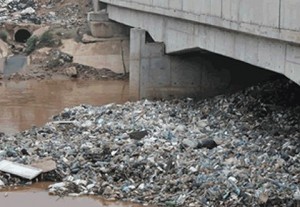Political interference, corruption said to mar Ghana sanitation laws
 Community scorecard exercises conducted in Accra Metropolitan Assembly has cited political interference and corruption as reasons ruining the effective enforcement of sanitation by-laws, thus thwarting authorities’ efforts to deal with waste management problems in the city.
Community scorecard exercises conducted in Accra Metropolitan Assembly has cited political interference and corruption as reasons ruining the effective enforcement of sanitation by-laws, thus thwarting authorities’ efforts to deal with waste management problems in the city.
Mr Benjamin Lartey, the Lead facilitator on the scorecard findings, told participants at a WASH stakeholders’ coordination meeting.
WaterAid Ghana in partnership with the Coalition of NGOs in Water and Sanitation with financial backing from the European Union, carried out the exercise in six metros featuring some 263 people.
It formed part of a project, aimed at empowering citizens and civil society organisations’ deals to improve delivery, equity and sustainability of water, sanitation and hygiene in the capital city.
The forum was organised by People’s Dialogue on Human Settlement and WaterAid Ghana.
Mr Salifu Abdul-Mujeeb, the Youth, Health, Skills and Development Officer of Peoples’ Dialogue, said the session was to set the agenda for action by identifying key issues for policy influence.
The proportion of Ghanaians with access to improved sanitation has only increased by merely 11 per cent since 1990, the tally indicated, in spite of numerous commitment declarations at different international stages by the government.
Mr Lartey, however, said from the exercise, there had been some improvement in some of the indicators such as health education.
“This was tied to the fact that in this year, no cholera epidemic has been recorded,” he said. “However, waste management has been a major challenge.”
This, he attributed this to either waste contractors not working or the attitude of community members towards those indicators being poor.
“Enforcement of the laws to check the community members and the waste contractors by the limited environmental officials is a major challenge,” he also said.
“Political inferences and corruption have marred the efficiency of the laws and needs to be rectified.”
As part of the recommendation in the scorecard, waste contractors and AMA must work closely to help solve waste challenges facing the capital city.
Education and sensitsation also remained paramount in solving the situation, officials said, and urged the retooling of sanitation officers so that they could reach out to communities and sensitise people on good hygiene practices.
Mr Graham Sarbah, the AMA Sanitation and Water Project Coordinator, told reporters that the Assembly was tackling the issues of household and institutional toilets deficiencies.
“Apart from the household toilet, we are also looking at the institutional toilets, the schools especially the basic schools, in AMA for instance, most of them have toilets already but are not functioning because of misuse,” he said.
“We are renovating all those toilets for them and this time, we are also educating the school authorities and the children on how to use the toilets so it won’t get back to the situation that they are now.”
“We are aiming that before the end of the project [2018], we would have constructed 2,000 toilets in households.”
“Now we’ve been able to do a little above 90 but we are still moving forward.”
Mr Sarbah explained that each household was supposed to pay 50 per cent of the cost estimated at GH₵ 4,000, while the remaining 50 was borne by the World Bank.
Source: GNA
